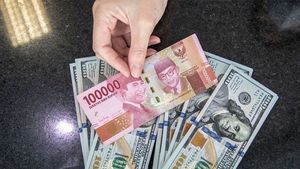JAKARTA - The chairman of the DPR's Inter-Parliamentary Cooperation Agency (BKSAP), Fadli Zon, highlighted the scarcity and high price of cooking oil in Indonesia. According to him, the cooking oil crisis has tarnished the face of Indonesia as the host of the G20 Presidency. Because, Indonesia is one of the countries that has the largest oil palm plantations in the world.
"Actually, the cooking oil crisis in the middle of a sea of palm oil plantations is a bit embarrassing for us as the host of the G20 Presidency," said Fadli via his Twitter account, Wednesday, February 23.
Fadli Zon's statement commented on the opinion of senior economist Faisal Basri who said the scarcity of cooking oil was the work of the government. The reason is, there are policies that make a big shift in domestic consumption of crude palm oil.
Where initially, crude palm oil (CPO) was dominated for the food industry. Meanwhile, now, it is also earmarked for biodiesel needs.
Fadli Zon then continued with the question whether the scarcity was also because the presidential assistant in the matter of procuring cooking oil could not work.
"The Ministry of Trade is incompetent in managing cooking oil?" he asked. He hoped that the oil crisis would not occur in the National Capital of the Archipelago in the future.
“Hopefully the cooking oil crisis will not happen in the new capital. What does the world say?" said Fadli Zon. Furthermore, the Deputy Chairperson of the Gerindra Party assessed that the scarcity of cooking oil was due to the accumulation of chaotic palm oil governance in Indonesia. "The second note that I think is the fundamental problem of the current scarcity is the existence of cartel practices in palm oil governance in Indonesia," he said. According to him, the government must break down the dominance of these business actors so that there is no longer a concentration of the palm oil market in only a few groups. "This is an important step that the government must take to stabilize cooking oil prices that are sustainable in the country," said Fadli.
He said tensions between Russia and Ukraine were feared could lead to an increase in flour prices because the two countries are the world's main producers.
Another threat is climate change. The wet situation will disrupt the production of producing countries in Latin America, thereby increasing soybean prices.
"This is all we talk about and discuss to ensure stock conditions and mitigate price spikes," he said, quoted in his official statement, Friday, February 20.
In addition, he also mentioned the supply of cooking oil which he believed would return to normal in the near future. For other commodities, such as sugar, the supply is abundant and prices are under control.
"For this reason, the Ministry of Trade ensures that the stock is available, does not harm farmers, and at the same time ensures that during fasting and Eid there are no unwanted things," he said.
The English, Chinese, Japanese, Arabic, and French versions are automatically generated by the AI. So there may still be inaccuracies in translating, please always see Indonesian as our main language. (system supported by DigitalSiber.id)













